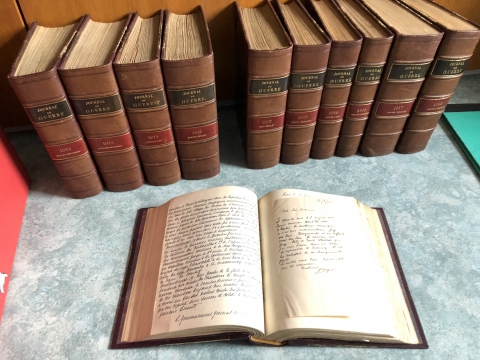11 dairies, handwritten by the Countess Jean d’Oultremont, have been acquired by the King Baudouin Foundation’s Heritage Fund. The 4,000 pages of the diaries are an important historical testimony about Belgium during the World War I under the occupation. They have been entrusted to the In Flanders Fields Museum in Ypres.
A very personal account
This exceptional collection of 11 volumes comprises more than 4,000 pages, handwritten by the Countess d’Oultremont. Initially, the pages of the diaries were loose and kept in a ring binder. The half-leather dated bindings were made after World War I to preserve the precious manuscript, whose pages are often enriched with photographs, letters from the family and press cuttings. This work is an important historical testimony about Belgium under the occupation.
A personal testimony about World War I
Dating from 22 July 1914 to 24 November 1918, the diaries recount, in French, daily life in Brussels during World War I, as well as the situation on the front. They are above all the vision of a woman belonging to the Belgian aristocracy. Born in 1859, Princess Renée de Mérode married Count and Grand Marshall Jean d’Oultremont in 1881. The Count was deported to the camp of Holzminden during the war and died shortly after his return home in 1917. In 1914, the Countess joined the Red Cross and throughout the war devoted herself to charitable works, to wounded children and the needy. She conducted numerous missions, including visits to the Belgian camps of Zeimst and Amersfoort. The diaries are of great historical interest, thanks to the Countess’s many descriptions. They have already been the subject of a 1991 article written by Sorgeloos and Veirman, which appeared in the Revue belge d’histoire militaire (Belgian review of Military History). At that time, Veirman was the owner of the voluminous diaries, which he had bought at a sale of part of the d’Oultremont family’s heritage in the 1980s.
The In Flanders Fields Museum of Ypres
Through the acquisition of the diaries and by entrusting them to the In Flanders Fields Museum of Ypres, the KBF’s Heritage Fund has enabled a story to be shown that helps us understand the life and vision of Belgian civilians during the occupation of World War I. The Museum has undertaken to digitise the diaries, so as to make them accessible online to as many people as possible through the Museum’s website.
For the benefit of the general public
The King Baudouin Foundation is committed to the preservation and protection of Belgian heritage. To achieve this, it acquires works of art, objects and historical documents which it promotes and makes accessible to everyone, so as to transmit them to future generations. The Foundation’s collection is spread across over 90 museums and public institutions.
